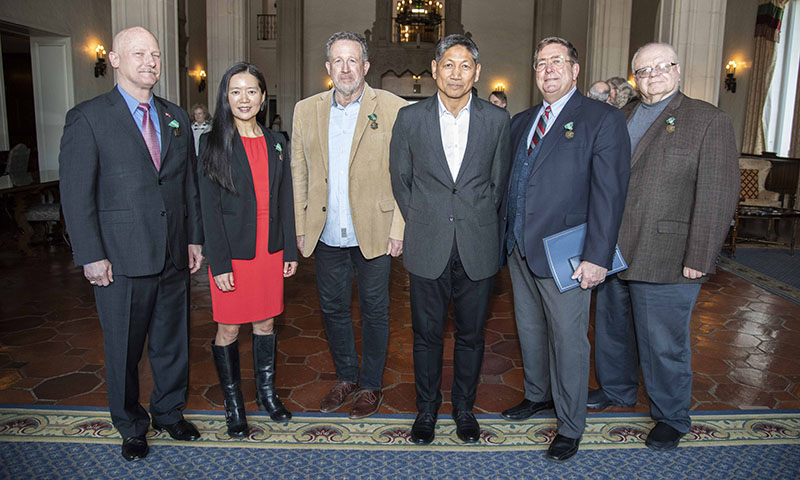In recognition of their efforts to advance future force design and the next-generation Joint Warfighting Concept, several researchers from the Naval Postgraduate School (NPS) were recently honored with the U.S. Navy’s Civilian Service Commendation Medal for the development of quantifiable models that relate operational variables and integrated deterrence in a high-interest operational scenario in the U.S. Indo-Pacific Command (INDOPACOM) region.
The awards recognized the collective efforts and outstanding contributions of Associate Chair Brian Greenshields and Associate Professor Tommy Jamison, both from NPS’ Department of Defense Analysis; Professor of the Practice Jeffrey Kline and Faculty Associates-Research Mary McDonald and Stephen Upton from the Department of Operations Research; Department of Defense Management lecturer Dr. Mitchell McCarthy; and numerous other NPS personnel and students.
Also honored were two resident faculty members from the Naval War College (NWC) at NPS – Dr. Yvonne Chiu, Associate Professor of Strategy and Policy, and Dr. Jonathan Czarnecki, Professor of Joint Military/Maritime Operations.
Dr. Andy Hernandez, a retired U.S. Army colonel and current Associate Chair for Operations with the NPS Department of Systems Engineering, serves as lead principal investigator on the project.
Initiated in April 2022 at the behest of then-Vice Adm. Stuart Munsch, director of Joint Force Development (J7) on the Joint Staff, the project aimed to develop detailed models encompassing critical variables pertinent to an operational scenario in the INDOPACOM region.
Specifically, the request was for NPS to develop an independent, multidisciplinary academic approach to examine the effects of operational variables on deterrence and to quantify those relationships. The initial study on military deterrence included a combination of problem structuring techniques, systems analysis, campaign analysis, wargaming, computer simulation and experimentation, political analysis, and thorough regional expertise. More than two dozen faculty members and researchers, along with more than a dozen students, contributed to the research effort.
The interdisciplinary team was comprised of experts from diverse fields, including regional security studies, political science, military operations, systems engineering, and computer science. The team was assembled from NPS and the Naval War College, as well as other government and non-governmental institutions.
Chiu served as team leader for the project’s indications and warning, as well as value modeling efforts, and was one of many significant contributors to the project’s success.
“The value modeling and the simulations models prompted some reconsideration and revision of existing DOD doctrine, and generated actionable strategic, operational, and force design recommendations across the relevant operational variables for Joint Staff J7 and INDOPACOM,” noted Chiu. “This project also demonstrates the use and value of this particular multi-method and multi-disciplinary approach to mission engineering.”
Beyond its immediate impact, the project lays the groundwork for future endeavors, particularly in the realm of economic deterrence.
“Other DOD units have expressed interest in both the project’s results and its tools and methodology,” said Chiu. “So, there will be applications of the results, tools, and methodology for other DOD research and planning projects.”
The project team’s results were presented to multiple offices, including J7, the Navy’s Warfighting Development team (OPNAV N7), and INDOPACOM’s Strategic Planning and Policy Directorate (J5), from July to October 2023. In February 2024, the team presented results regarding “Posture” as an operational variable during INDOPACOM’s Posture Conference. The discussion led the INDOPACOM J56 to make some decisions in its current approach.
Hernandez emphasized the significance of integrating the team’s results into future concepts.
“The J7 will use these results to inform Joint Force Design and the next generation of the Joint Warfighting Concept,” said Hernandez. “Additionally, the NPS project results prompted J7 to expand the work. While the initial effort was on the military instrument of national power, the work for FY24 and FY25 will develop economic deterrence options … These FY24 and FY25 efforts can greatly contribute to developing INDOPACOM’s theater engagement plan and deterrence efforts.”
The next phase for the project team is the development of functional economic deterrence options (FEDO). This effort began in February 2024 and is ongoing.
“NPS’ emphasis on STEM education alongside its regional and strategic studies education in its own departments and in the resident NWC-at-NPS program provided a central pool of diverse experts who already converse with each other on national security issues,” said Chiu. “This was a solid foundation on which to build their collaboration and broader coordination with other institutions for this project.”
The recognition highlights NPS’ pivotal role in advancing defense capabilities and underscores the institution’s commitment to excellence in defense research and education.


